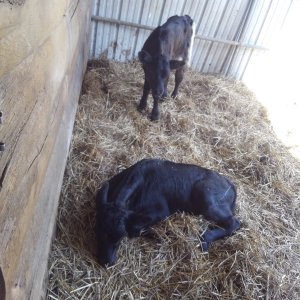What made you rescue the newborn calf in the neighbours pasture? Is the mother dead?
Well.... The neighbor has 80 acres, mostly scrub and forest. He has 14 cows & calves at the moment (has had up to 30). He has not managed them at all - just lets them run wild, no hay in winter, no shelter nor barn, comes by once every couple of weeks to 'check' on them. Luckily, there is a year-round spring on the property so water is never a problem. Then once a year, an acquaintance of his comes with a trailer and they round up whatever they can catch for auction. Pays his land taxes. The neighbor has lost many calves to coyotes and starvation in the past, and two bulls to injuries. His herd was seriously inbred.
My husband befriended him when we bought our place and has worked an arrangement to help. My husband has done extensive brush-hogging, built a corral and loading 'alley', repaired fencing, feeds them hay in winter and minerals all year, and helps (no, really, manages) during calving, roundups, castration, and shots. Took a couple of years, but convinced him to replace the bull and to separate him March-June every year. The two of them pool their equipment in summer and fall, and cut hay from a few other willing neighbors to stockpile enough for all of his cattle and ours. He is generally 'paid' for his efforts with one or two calves every year.
Last two years, this particular cow lost her calves. We never found them, assume they died or were predated. She is a 19-yr-old simmental/charolais/hereford cross - maybe some holstein - whose udders literally drag the ground when she's full, and has three/four ruptured teats. We believe she cannot nurse effectively. Neighbor refuses to cull her. My husband was cutting brush yesterday, when he spotted her and a newborn calf. Called the neighbor to come check, and decision made to 'steal' the calf from her to bottle-feed. He has no time nor inclination to manage it, and so..... here we are.

